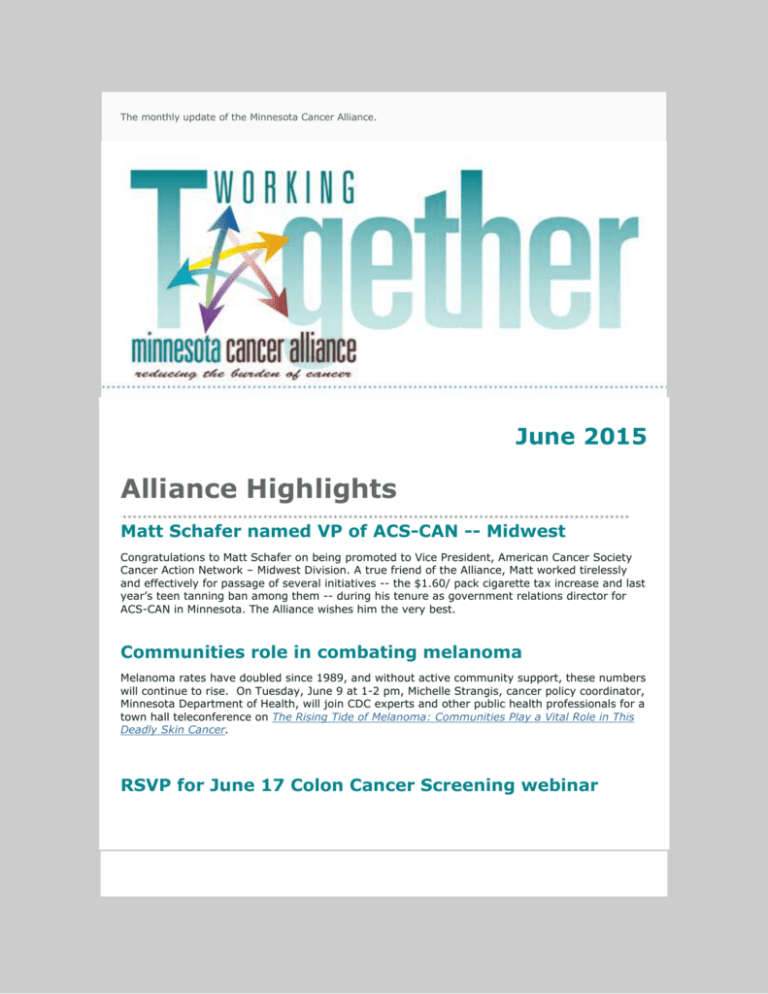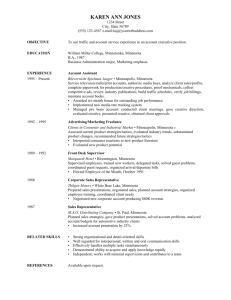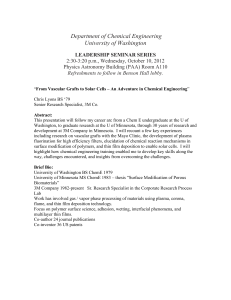
The monthly update of the Minnesota Cancer Alliance.
June 2015
Alliance Highlights
Matt Schafer named VP of ACS-CAN -- Midwest
Congratulations to Matt Schafer on being promoted to Vice President, American Cancer Society
Cancer Action Network – Midwest Division. A true friend of the Alliance, Matt worked tirelessly
and effectively for passage of several initiatives -- the $1.60/ pack cigarette tax increase and last
year’s teen tanning ban among them -- during his tenure as government relations director for
ACS-CAN in Minnesota. The Alliance wishes him the very best.
Communities role in combating melanoma
Melanoma rates have doubled since 1989, and without active community support, these numbers
will continue to rise. On Tuesday, June 9 at 1-2 pm, Michelle Strangis, cancer policy coordinator,
Minnesota Department of Health, will join CDC experts and other public health professionals for a
town hall teleconference on The Rising Tide of Melanoma: Communities Play a Vital Role in This
Deadly Skin Cancer.
RSVP for June 17 Colon Cancer Screening webinar
Resa M. Jones, MPH, PhD, from the Massey Cancer Center at Virginia Commonwealth University,
will share what she has learned about people’s preferences regarding colon cancer screening
tests and how those preferences affect the likelihood of getting screened during a June 17
webinar sponsored by the American Cancer Society and the Minnesota Department of
Health. RSVP to Matt Flory if you wish to participate.
Make it about change presentations spark enthusiasm
Representatives from 27 organizations turned out May 7 to learn how to make policy and system
changes that improve health. Facilitator Maggi Adamek underscored the importance of five big
“C’s” when working for change, and Maria Regan Gonzalez of Bloomington Public Health and Jodi
Gertken of CentraCare showcased some of their good work. Thanks to The Center for Prevention
at Blue Cross and Blue Shield of Minnesota for co-sponsoring the event with the Alliance.
Partner Updates
Year One Report: Tan Free Teens
Volunteers with the American Cancer Society Cancer Action Network hit the road in February and
April to see whether Minnesota tanning facility operators know they are prohibited from allowing
minors to tan and that a notice to that effect must be posted where it can be seen. Although
nearly all operators at facilities visited knew about the state’s new tanning law, a substantial
number (43%) did not have a sign posted. ACS-CAN thinks there is room for improvement.
Dr. Atul Gawande to speak in St. Paul
Minnesota Network of Hospice and Palliative Care is bringing surgeon, best-selling author, and
increasingly sought-after speaker Atul Gawande, MD, to the St. Paul River Centre on Sept. 18 for
a discussion about Being Mortal, the title and topic of his latest book. Minnesota Public Radio’s
Cathy Wurzer will moderate the discussion. Registration to open June 15.
Honoring choices across cultures – new short course
Healthcare professionals can get practical advice and tools for communicating about advance
care planning with compassion and cultural sensitivity by enrolling in a new online course
developed by the University of Minnesota’s Global Health Department and Honoring Choices
Minnesota.
Facilitators and workshop participants wanted
Pathways Health Crisis Resource Center will offer four 3-day Renewing Life retreats for breast
cancer survivors and a training for 20 people who want to become Renewing Life facilitators,
thanks to a grant from Susan G. Komen Minnesota.
Worth Noting
Celebrate National Cancer Survivors Day
Sunday, June 7 is the 28th Annual National Cancer Survivors Day. With more than a quarter-of-amillion cancer survivors in our state, this is a day for individuals, families and communities to
celebrate life even as they ask what more can be done to reduce the burden of cancer.
ThaoMee Xiong to head Center for Health Equity
The Minnesota Department of Health welcomes ThaoMee Xiong, JD, MPH, as the new director of
the Center for Health Equity. She previously held the position of policy director with the
Minnesota Housing Partnership. She comes to the state with experience in professional legal
advocacy and public policy on issues related to poverty, immigration, refugee resettlement,
domestic violence, housing, and civic engagement.
Tom Frieden named one of Time magazine’s Top 100
In case you missed it, Dr. Tom Frieden, director of the Centers for Disease Control and
Prevention, made Time’s list of the 100 most influential people of the year for 2015. Frieden has
gained recognition as a leader for his efforts during the Ebola epidemic and his advocacy for
smoking bans in bars and restaurants, among other public health initiatives.
Medicare turns 50 in July
Medicare: 50 Years of Ensuring Coverage and Care is the first in a series of Commonwealth Fund
Reports that trace the evolution of Medicare and its accomplishments and challenges over the
past 50 years. Fact: 10,000 Americans turn 65 every day and enroll in Medicare.
Surgeon General calls for a ‘prevention-based society’
In a wide-ranging interview with Lenny Bernstein of The Washington Post, Surgeon General Vivek
Murthy said he envisions a prevention-based society where “every institution, whether they’re a
hospital or a clinic, or a school, an employer or a faith-based organization, recognizes and
embraces the role that it can play in improving health.” His goal is to move away from talking
about illness and instead work with community organizations to build cultures of wellness.
Just released: Trends in Minnesota Community
Hospitals, 2010-2013
Inpatient admissions declined while observation stays and outpatient surgeries and visits
increased at Minnesota’s 133 community hospitals, according to an Issue Brief released in May by
MDH’s Health Economics Program. The report indicates Minnesota hospitals continue to perform
well financially.
Study Finds: America is still underinsured
The Commonwealth Fund found that underinsurance is still a major problem for millions of
Americans, 31-million to be exact. The report uses a measure of underinsurance that compares
out-of-pocket health care expenses and the cost of deductibles with household income. The rates
doubled between 2003 and 2010, but have now hit a plateau.
Education Programs and Events
Building Effective Collaborations- June 10
Professor Melissa Stone will speak about what is needed and what can get in the way of building
an effective collaboration during a two-hour forum scheduled for June 10 at the University of
Minnesota’s Humphrey School of Public Affairs. Registration closes Monday, June 8.
Public health researchers to gather in Minneapolis
The Public Health Systems Research (PHSR) Interest Group will hold its annual meeting at the
Hilton Minneapolis on June 16 and 17 following AcademyHealth's 2015 Annual Research Meeting
at the Minneapolis Convention Center on June 14 and 15. View the agenda and register by June
11th.
Still time to register for e-Health Summit- June 16-17
The 11th annual Minnesota e-Health Summit is organized around a theme of Connecting
Communities to Advance Population Health. David Ross, ScD, director of the Public Health
Informatics Institute, and Mitchell H. Katz, MD, director of the Los Angeles county Department of
Health Services are featured speakers for the two-day conference. Register at
https://www.regonline.com/Register/Checkin.aspx?EventID=1686554.
Evaluation and social justice workshops- June 23-25
Facilitated by professionals with a variety of expertise, the Minnesota Evaluation Studies Institute
(MESI) is offering four all-day workshops this summer followed by two half-day meetings. The
events will take place at the Carlson School of Management. To learn more and register, click
here.
Resources and Publications
Latest data on cigarette smoking and smokeless
tobacco use in adults
CDC has released state-wide findings on tobacco use from the 2011-2013 BRFSS. Five states
saw significant increases in the concurrent use of cigarette smoking and smokeless tobacco.
Minnesota was not one of them.
Cancer screening rates show little improvement
CDC’s Morbidity and Mortality Weekly Report for the week of May 8 includes a study that shows
no improvements nationally in breast, colorectal and cervical cancer screening rates from 20102013, based on National Health Interview Survey (NHIS) data. Cervical cancer screening rates
actually declined during the three-year period.
New national data on HPV
The Journal of the National Cancer Institute released new population-based data from a CDC
study examining human papillomavirus DNA in tissue samples of cancer cases, largely samples
from 2004-2005. These records provide more accurate estimates of cases of potentially
preventable HPV-associated cancers.
New Small Area Health Insurance Estimates
The U.S. Census Bureau has released its 2013 Small Area Health Insurance Estimates (SAHIE),
which provide single-year estimates of health insurance coverage for all counties in the nation.
Cell phones, a tool to engage patients
An online survey conducted in 2013 found that only about 1 in 4 safety net clinics was making
use of cell phones in care delivery. In Mobile Health and Patient Engagement in the Safety Net,
The Commonwealth Fund examines the potential for using mobile technology to engage patients
in chronic disease management.
MN works to build understanding about palliative care
Thanks to support from the Minnesota Network of Hospice and Palliative Care and the Greater
Twin Cities United Way, Twin Cities Public Television has launched a video that explains the
basics of palliative care in just one minute and forty-two seconds. You can watch it on the
MNHPC website or YouTube.
Policy, systems, and environmental change strategies
The American Cancer Society and Comprehensive Cancer Control have developed a framework
for using a PSE approach, to influence health behaviors. For a more in-depth look, the
Comprehensive Cancer Control National Partnership provides Policy, Systems, and Environmental
Change Resource Guide. The guide offers resources, models, and tools to assist states in
planning and implementing PSE work.
Now available: Health Equity Summit webcast
30 Years of Advancing Health Equity; The Heckler Report: A Force for Ending Health Disparities in
America, from the U.S. Department of Health and Human Services (HHS) and the HHS Office of
Minority Health, is available for on-demand viewing until July 27.
Free cancer patient navigation training
The George Washington Cancer Institute has developed a free, 20-hour online training course for
patient navigators. Designed for “lay navigators” (people who don’t have a clinical license), the
course offers a series of self-paced modules that cover fundamental information to effectively
navigate patients using the Center’s consensus-based Core Competencies for Patient Navigators.
Patient Empowerment Series
The Patient Advocate Foundation is hosting a free webinar series for people who pre-register.
Live sessions are held the 3rd Thursday of every month. The series provides tools to help patients
gain the skills needed to advocate for their own healthcare needs.
HPV vaccination materials on Make It Your Own site
Go to www.miyoworks.org for pictures, templates, and key messages that can be used with
parents of preteens and young adults when talking about the benefits of the HPV vaccine.
New Map: State Community Health Worker Models
An interactive map developed by the National Academy for State Health Policy highlights how
states are integrating Community Health Workers (CHW) into their health care
systems. Information about financing, education, training, certification, legislation, and CHW
organizations, roles and scope of practice can be accessed by state or category.
Know your family medical history
The Prevent Cancer Foundation provides an interactive chart to help patients and providers
decide which cancer screenings are advised and when.
Announcements
RWJF calls for planning grant proposals
The Robert Wood Johnson Foundation (RWJF) is seeking four national program centers to help
build a national Culture of Health. The online application process is opened June 3 and closes July
29.
Working Together is published monthly to provide Alliance members with timely information
about comprehensive cancer control topics. We invite you to share the update with colleagues,
and we invite your contributions. Brief Alliance highlights and announcements about upcoming
partner programs, events, and new resources should be submitted by the 15th of the month to
communications@mncanceralliance.org.
The Minnesota Cancer Alliance is a coalition of health organizations, community groups and
volunteers dedicated to reducing the burden of cancer for all Minnesotans. Since 2005, its
members have pursued five overarching goals: to PREVENT cancer from occurring; to DETECT
cancer at its earliest stages; to help patients ACCESS effective therapy; to OPTIMIZE quality of
life; and to ELIMINATE disparities across the cancer care continuum. The Alliance is guided by a
statewide steering committee representative of member organizations.
For additional information regarding the Minnesota Cancer Alliance, please visit our website at
mncanceralliance.org.
forward to a friend
Copyright © 2015 Minnesota Cancer Alliance, All rights
reserved.
unsubscribe from this list | update subscription preferences





